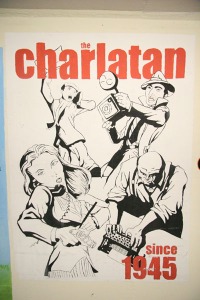 If I believed in hell, I would surely be paving a path to the fiery pit with my good intentions. Although it did cross my mind during the 2012 Association of Writers and Writing Programs Conference in Chicago that hell might be a windowless basement full of other writers. Happily, the 2013 AWP Conference will take place in a convention center, a building designed for the mad throngs that now attend this annual meeting.
If I believed in hell, I would surely be paving a path to the fiery pit with my good intentions. Although it did cross my mind during the 2012 Association of Writers and Writing Programs Conference in Chicago that hell might be a windowless basement full of other writers. Happily, the 2013 AWP Conference will take place in a convention center, a building designed for the mad throngs that now attend this annual meeting.
My good intentions at the 2012 event were to write about a panel I attended, “Literature and the Internet in 2012.” The event was described thusly: “The literary editors of four leading web magazines—HTMLGiant, the Rumpus, PANK, and the Faster Times—offer a roundtable discussion about how the Internet is changing literature and literary publishing in the 21st century.”
This is sort of a tall order, topic-wise, and the impossibility of doing it justice became immediately clear: I got the impression our presenters had—in response to the enormity of the subject—come to the event with nothing but their quick wits at the ready. Situated in the gilded grand ballroom of the Palmer House Hilton in Chicago, beneath the glittering weigh of eight chandeliers, four editors and writers: Stephen Elliott of the Rumpus; Blake Butler, of HTML Giant; James Yeh, of The Faster Times; and Roxanne Gay of Pank Magazine, who had lost her voice, sat perched on a plywood dais draped in cloth, sipping water and warily eyeing the room.
The contrast between the environment and the very casual, unstructured nature of the conversation made me think of a Coen Brothers style scenario, in which a gaggle of turn-of-the-last century hucksters have been corralled by mystified townsfolk who want to know, dammit, how does this gadget you sold us work? And didn’t you promise us we’d make some money off it, too?
This obsessive interest in selling —accompanied by the undertone of desperation wrought by upheaval in the publishing industry —meant that deeper issues went largely unaddressed, and the whole debate about how literature is being changed devolved into a conversation about how to use the Web to market oneself. This was unfortunate, since I felt certain that the presenters each had something worthwhile to say—each of them is creating innovative online content. Stephen Elliott, in particular, seemed to have a cogent and broad-ranging vision of how the internet as a medium offered new aesthetic possibilities for writers.
Here are a few of their responses to questions from the moderator, each of which revealed a bit about the editors themselves:
How has the internet changed literature?
Gay: “The internet has decentralized gatekeeping. Nobody cares what you look like, they just want to hear what you have to say.”
Butler: “The thing I like about the internet is the weird little tides of argument and BS, so I’m hands off as an editor. I like that freedom and openness. The comment section — you can choose to look at those or not.”
Elliott: “Design, layout and length [on the web] signify a different form. There are studies tracking eyeballs, the way you read online (your eyes sweep over, then down).”
Why publish in print at all?
Elliott: “It’s not print versus online, that’s like saying jazz versus rock and roll.”
What does the internet do to the commerce of being a writer —is it still possible to make a living?
Elliott: Writing literary books was never a good way to make a living. Among artists there is a free economy, I’ve done a lot of writing for free.
How can writers market themselves?
Elliott: I think you should put the same creativity and integrity into marketing your work as you put into the creation of your work.
Butler: Yeah, if you don’t want to be on Facebook, don’t do it.
And here are some questions I am still hoping to find some answers to:
- What aesthetic possibilities are available ONLINE that are not available in print?
- What does the immediacy and demand for new, fresh content DO the writing impulse, the editing process, the thought process that governs the complex, multilayered process of writing?
- Is the internet better at delivering certain types of content?
- How do these qualities of writing for the web—community, interlinking, associative properties, compression, a sense of urgency and immediacy—affect content?
- How do print and digital culture converge and communicate with each other?
- Does it make sense to replicate content in both print and digital forms?
So, I’ll be at AWP 2013 in Boston for much of the coming week, and I’m hopeful that some of the offerings on digital media will give me some more insight into the ways the internet and digital culture are impacting the creative process. And I will tackle the first person that derails a conversation about art with questions about commerce—we’ll go bankrupt on selling, you know?
Discussion
No comments yet.